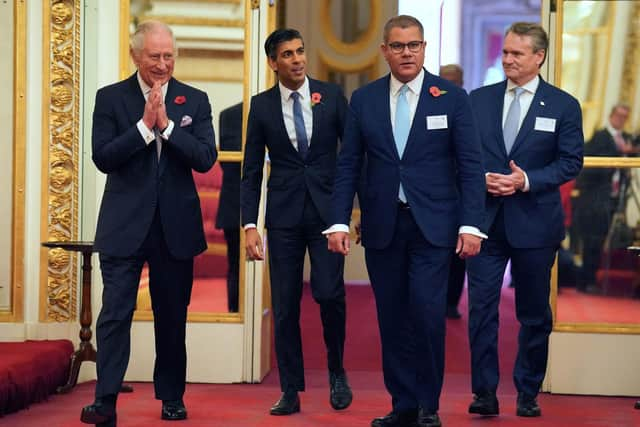Autumn statement: Rishi Sunak reviews major projects and considers capital gains tax rise to fill £50bn budget black hole
Business secretary Grant Shapps hinted Northern Powerhouse Rail between Liverpool and Hull would be scaled back from a grander vision for the project committed to by former prime minister Liz Truss.
Downing Street was forced to deny it would be scrapping a commitment to build a new nuclear plant in Suffolk as part of efforts to find savings ahead of the autumn budget.
Advertisement
Hide AdAdvertisement
Hide AdConcerns that Sizewell C could be axed or delayed were sparked by suggestions from officials, but No 10 insisted it was a “crucial” project and that it hoped to conclude negotiations quickly.


Chancellor Jeremy Hunt and the Prime Minister are looking for sweeping cuts ahead of the November 17 budget, as the Bank of England warns of the longest recession on record.
Among other moves being considered by Mr Hunt is an increase in capital gains tax on the sale of assets such as shares or bonds.
The manifesto the Conservatives won the 2019 election on promised Northern Powerhouse Rail between Leeds and Manchester.
While in No. 10, Ms Truss backed a full-fat vision for the line, pledging that expanded plans would include a stop at a new station in Bradford.
But Mr Shapps told the BBC: “The line itself can deliver a 33-minute journey from Manchester to Leeds, quadruple nearly the capacity of that line, and do so without having to wait an extra 20 years beyond the delivery of what the upgrade can do.
“There wasn’t really much point in going and blasting new tunnels through the Pennines.
“It’s not true to say we’re not delivering on what we said we would do on levelling up the North.”
Advertisement
Hide AdAdvertisement
Hide AdShadow transport secretary Louise Haigh accused the Government of having “crashed the economy” and then making the North pay for the fall-out.
“A lost decade of broken Tory promises has left the North with second-rate infrastructure, and rail services in crisis, holding the economy back,” the Labour MP said.
“Rishi Sunak told voters he would deliver Northern Powerhouse Rail, before abandoning it at the first opportunity.
“This Conservative Government have no mandate, no platform and no plan – they crashed the economy, and now they want northern communities to pay the price.”
Downing Street said it remains “committed” to the Integrated Rail Plan (IRP), which contains a less extensive vision for Northern Powerhouse Rail than committed to by Ms Truss.
And the Prime Minister’s official spokesman said transport secretary Mark Harper was reviewing “a number of options” on how the ambitions are achieved.
“The Government is of the view that this approach will deliver those benefits sooner than under alternative plans,” the official said.
“There are a number of options on how we deliver those high-speed services to Leeds, for example, and the transport secretary is looking at those closely.”
Advertisement
Hide AdAdvertisement
Hide AdMeanwhile, he firmly denied Sizewell C was being reviewed after a Government official told the BBC: “We are reviewing every major project, including Sizewell C.”
The spokesman said “constructive” negotiations were taking place with EDF, the French state-owned energy giant behind the project, and that “we hope to get a deal over the line as soon as possible”.
“It’s not accurate to say we are scrapping it, our position on Sizewell C has not changed,” he said.
“It remains crucial to reducing our reliance on fossil fuels, increasing our energy security and meeting our net-zero ambitions.
“We hope to get a deal over the line as soon as possible, there are negotiations (with EDF) ongoing.”
Meanwhile, former Bank of England governor Mark Carney has doubled down on his claim that Brexit would add to inflation and devalue the pound, arguing it “hasn’t recovered” since the sharp drop after the EU referendum.
He told BBC Radio 4’s Today programme he had forecast the exchange rate would stay down, adding to inflationary pressure, and stressed the economy would shrink “which is the situation we have today where the Bank of England has to raise interest rates despite the fact that the economy is going into recession”.
Downing Street, however, insisted the economic challenges have been caused by the coronavirus pandemic and Vladimir Putin’s war in Ukraine, declining to comment on the effect of Brexit.
Advertisement
Hide AdAdvertisement
Hide Ad“Our focus is on ensuring we have stability and fiscal credibility,” the official spokesman said. “That’s what the Chancellor and the Prime Minister are focused on rather than on a decision taken a number of years ago where people made a clear decision.”
The UK’s financial outlook has grown more dire, with the Bank hiking interest rates for the eighth time in a row, going from 2.25 per cent to 3 per cent on Thursday.
The Government’s job has been made harder by the disastrous mini-budget unleashed by Ms Truss and Kwasi Kwarteng, when they were prime minister and chancellor.
Questions remain for individuals in Mr Sunak’s Government, with his policing minister Chris Philp having been chief secretary to the Treasury under Mr Kwarteng.
On Friday he refused to apologise for his role in the financial statement that unleashed turmoil in the financial markets and threatened the UK economy.
Instead he sought to apportion maximum blame on Ms Truss, telling BBC Breakfast: “The decisions around the mini-budget were taken principally by the then-prime minister and to a lesser extent the then-chancellor.”
Comments
Want to join the conversation? Please or to comment on this article.